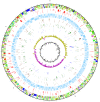Simultaneous assay of every Salmonella Typhi gene using one million transposon mutants
- PMID: 19826075
- PMCID: PMC2792183
- DOI: 10.1101/gr.097097.109
Simultaneous assay of every Salmonella Typhi gene using one million transposon mutants
Abstract
Very high-throughput sequencing technologies need to be matched by high-throughput functional studies if we are to make full use of the current explosion in genome sequences. We have generated a very large bacterial mutant pool, consisting of an estimated 1.1 million transposon mutants and we have used genomic DNA from this mutant pool, and Illumina nucleotide sequencing to prime from the transposon and sequence into the adjacent target DNA. With this method, which we have called TraDIS (transposon directed insertion-site sequencing), we have been able to map 370,000 unique transposon insertion sites to the Salmonella enterica serovar Typhi chromosome. The unprecedented density and resolution of mapped insertion sites, an average of one every 13 base pairs, has allowed us to assay simultaneously every gene in the genome for essentiality and generate a genome-wide list of candidate essential genes. In addition, the semiquantitative nature of the assay allowed us to identify genes that are advantageous and those that are disadvantageous for growth under standard laboratory conditions. Comparison of the mutant pool following growth in the presence or absence of ox bile enabled every gene to be assayed for its contribution toward bile tolerance, a trait required of any enteric bacterium and for carriage of S. Typhi in the gall bladder. This screen validated our hypothesis that we can simultaneously assay every gene in the genome to identify niche-specific essential genes.
Figures




References
-
- Caygill CP, Braddick M, Hill MJ, Knowles RL, Sharp JC. The association between typhoid carriage, typhoid infection and subsequent cancer at a number of sites. Eur J Cancer Prev. 1995;4:187–193. - PubMed
-
- Charles IG, Maskell DJ. Transposon mediated differential hybridisation. 2001 Patent no. WO2001/007651.
Publication types
MeSH terms
Substances
Grants and funding
LinkOut - more resources
Full Text Sources
Other Literature Sources
